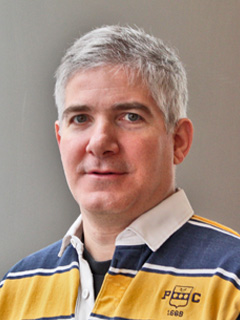HOW CAN WE HELP YOU? Call 1-800-TRY-CHOP
In This Section

Dr. Bassing's research program focuses on the genetic, epigenetic, and biochemical mechanisms by which mammals develop their immune systems while suppressing autoimmunity and genomic aberrations that cause leukemia or lymphoma.
Bio
Dr. Bassing's research program focuses on the genetic, epigenetic, and biochemical mechanisms by which mammals develop their immune systems while suppressing autoimmunity and genomic aberrations that cause leukemia or lymphoma.
Among his current projects, Dr. Bassing is investigating how genome topology regulates transcription and recombination; determining the mechanisms and role of allelic exclusion; researching the mechanisms and function of double strand break (DSB). feedback inhibition of V(D)J recombination; exploring RAG1 post-transcriptional control of gene expression; and investigating the tissue-, lineage-, and developmental-stage specific DNA damage response of immature lymphocytes.
Dr. Bassing and his colleagues have discovered that RAG1/RAG2 DSBs activate tissue-specific DNA damage responses and transcend hazardous intermediates during antigen receptor gene assembly. RAG cleavage in the genomes of lymphocyte progenitors and immature lymphocytes regulates the expression of ubiquitous and lymphocyte-specific gene transcripts to control the differentiation and function of both adaptive and innate lymphocyte lineages.
In addition, Dr. Bassing has shown that RAG1 ubiquitin ligase signals from these DSBs post-transcriptionally shape proteomes of immature lymphocyte, driving the development of B and T cell subtypes and facilitating proper negative selection of strongly auto-reactive cells. These discoveries raise important novel questions that have broad-ranging implications for basic immunology research and the screening, diagnosis, and treatment of human immunological disease.
Education and Training
BA, Johns Hopkins University (Biology), 1992
PhD, Duke University Medical Center (Biology), 1997
Fellowship, Harvard Medical School (Molecular Immunology), 2002
Titles and Academic Titles
Investigator
Associate Professor of Pathology and Laboratory Medicine
Professional Memberships
American Association for the Advancement of Science, 1992
American Association of Immunologists, 2005-
American Association for Cancer Research, 2008-
The Henry Kunkel Society, 2010-
Leukocyte Development Section in the Immunology Faculty, 2012-
National Institute of Arthritis and Musculoskeletal and Skin Diseases, National Institutes of Health, 2014-
Professional Awards
Pew Scholar in the Biomedical Sciences, 2005-2009
Michael S. Brown New Investigator Research Award of the Perelman School of Medicine of the University of Pennsylvania, 2009
Leukemia and Lymphoma Society Scholar, 2010-2015
Simon Flexner Award for Outstanding Mentoring of Graduate Students, 2017